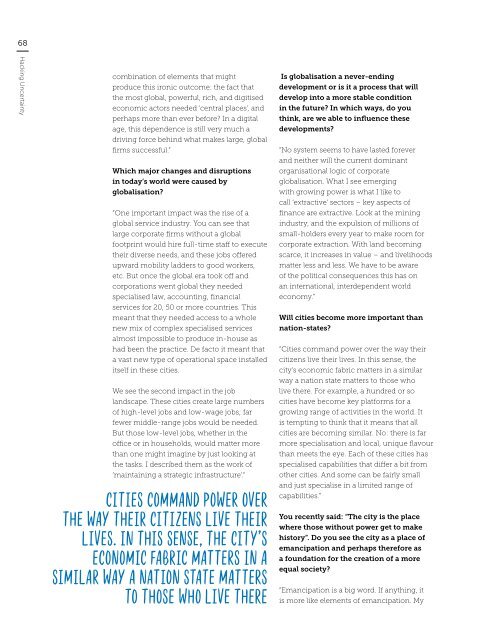trend-report-dps-web-version
You also want an ePaper? Increase the reach of your titles
YUMPU automatically turns print PDFs into web optimized ePapers that Google loves.
68<br />
69<br />
Hacking Uncertainty<br />
combination of elements that might<br />
produce this ironic outcome: the fact that<br />
the most global, powerful, rich, and digitised<br />
economic actors needed ‘central places’, and<br />
perhaps more than ever before? In a digital<br />
age, this dependence is still very much a<br />
driving force behind what makes large, global<br />
firms successful.”<br />
Which major changes and disruptions<br />
in today’s world were caused by<br />
globalisation?<br />
“One important impact was the rise of a<br />
global service industry. You can see that<br />
large corporate firms without a global<br />
footprint would hire full-time staff to execute<br />
their diverse needs, and these jobs offered<br />
upward mobility ladders to good workers,<br />
etc. But once the global era took off and<br />
corporations went global they needed<br />
specialised law, accounting, financial<br />
services for 20, 50 or more countries. This<br />
meant that they needed access to a whole<br />
new mix of complex specialised services<br />
almost impossible to produce in-house as<br />
had been the practice. De facto it meant that<br />
a vast new type of operational space installed<br />
itself in these cities.<br />
We see the second impact in the job<br />
landscape. These cities create large numbers<br />
of high-level jobs and low-wage jobs; far<br />
fewer middle-range jobs would be needed.<br />
But those low-level jobs, whether in the<br />
office or in households, would matter more<br />
than one might imagine by just looking at<br />
the tasks. I described them as the work of<br />
‘maintaining a strategic infrastructure’.“<br />
Cities command power over<br />
the way their citizens live their<br />
lives. In this sense, the city’s<br />
economic fabric matters in a<br />
similar way a nation state matters<br />
to those who live there<br />
Is globalisation a never-ending<br />
development or is it a process that will<br />
develop into a more stable condition<br />
in the future? In which ways, do you<br />
think, are we able to influence these<br />
developments?<br />
“No system seems to have lasted forever<br />
and neither will the current dominant<br />
organisational logic of corporate<br />
globalisation. What I see emerging<br />
with growing power is what I like to<br />
call ‘extractive’ sectors – key aspects of<br />
finance are extractive. Look at the mining<br />
industry, and the expulsion of millions of<br />
small-holders every year to make room for<br />
corporate extraction. With land becoming<br />
scarce, it increases in value – and livelihoods<br />
matter less and less. We have to be aware<br />
of the political consequences this has on<br />
an international, interdependent world<br />
economy.”<br />
Will cities become more important than<br />
nation-states?<br />
“Cities command power over the way their<br />
citizens live their lives. In this sense, the<br />
city’s economic fabric matters in a similar<br />
way a nation state matters to those who<br />
live there. For example, a hundred or so<br />
cities have become key platforms for a<br />
growing range of activities in the world. It<br />
is tempting to think that it means that all<br />
cities are becoming similar. No: there is far<br />
more specialisation and local, unique flavour<br />
than meets the eye. Each of these cities has<br />
specialised capabilities that differ a bit from<br />
other cities. And some can be fairly small<br />
and just specialise in a limited range of<br />
capabilities.”<br />
You recently said: “The city is the place<br />
where those without power get to make<br />
history”. Do you see the city as a place of<br />
emancipation and perhaps therefore as<br />
a foundation for the creation of a more<br />
equal society?<br />
“Emancipation is a big word. If anything, it<br />
is more like elements of emancipation. My<br />
argument is that in today’s world – when<br />
so many people are getting expelled from<br />
their land, the large cities become places<br />
where those expelled from rural areas can<br />
still find refuge. This is the reason why I have<br />
become so engaged with the whole issue of<br />
corporations buying big parts of our cities.”<br />
What will happen to the ‘powerless’ in<br />
cities if the buying of property by largescale<br />
investors continues? What is this<br />
process of expulsion going to mean for the<br />
citizens in the city?<br />
“This is indeed a very serious issue and that is<br />
why I called my latest book Expulsions: more<br />
and more are becoming marginalised, and<br />
are increasingly invisible to the economic<br />
eye. Even though we see more and more<br />
very low-wage jobs, these are not enough<br />
for meaningful livelihoods. Also, and more<br />
importantly to the social fabric of cities: these<br />
in today’s world<br />
large cities<br />
become places<br />
where those<br />
expelled from<br />
rural areas can<br />
still find refuge<br />
are jobs that will always stay in the same<br />
income bracket. There is no upward mobility,<br />
no matter how hard you work. The ladders<br />
are gone.”<br />
Are local politicians failing to understand<br />
what will be the effect of foreign investors<br />
buying property in a city? Are they able to<br />
influence or change this development?<br />
“Local politics is an enormously varied<br />
domain – for example it depends on the<br />
type of authority and resources granted to<br />
cities. But yes, I think that they matter and<br />
they do what can be done. More often than<br />
not this is a grey zone, and we might be able<br />
to do much more than we think we can do.<br />
For instance, the environmental question<br />
has made the rights of bikers an increasingly<br />
prominent issue in cities that never had much<br />
biking. There is probably much more room to<br />
innovate in most cities than we think.”<br />
Photo:<br />
Alex MacNaughton<br />
Hacking Uncertainty





